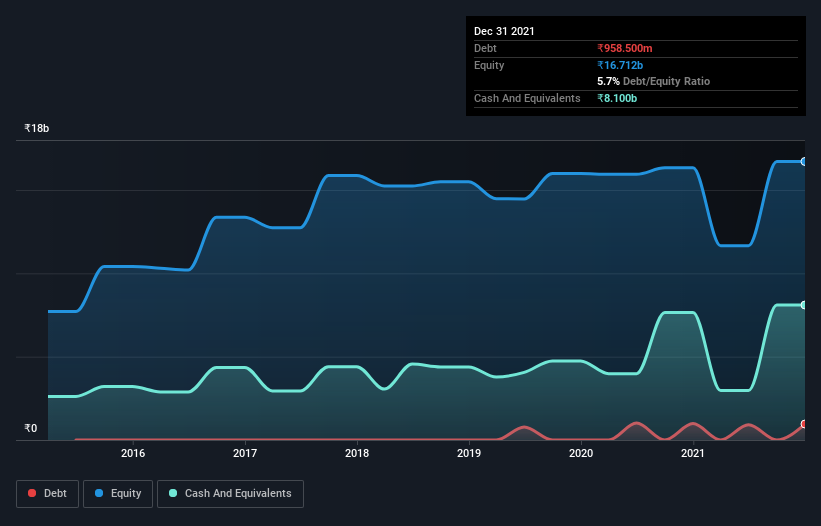- India
- /
- Personal Products
- /
- NSEI:COLPAL
Does Colgate-Palmolive (India) (NSE:COLPAL) Have A Healthy Balance Sheet?

Legendary fund manager Li Lu (who Charlie Munger backed) once said, 'The biggest investment risk is not the volatility of prices, but whether you will suffer a permanent loss of capital.' So it seems the smart money knows that debt - which is usually involved in bankruptcies - is a very important factor, when you assess how risky a company is. We note that Colgate-Palmolive (India) Limited (NSE:COLPAL) does have debt on its balance sheet. But is this debt a concern to shareholders?
When Is Debt Dangerous?
Debt and other liabilities become risky for a business when it cannot easily fulfill those obligations, either with free cash flow or by raising capital at an attractive price. Part and parcel of capitalism is the process of 'creative destruction' where failed businesses are mercilessly liquidated by their bankers. However, a more usual (but still expensive) situation is where a company must dilute shareholders at a cheap share price simply to get debt under control. Having said that, the most common situation is where a company manages its debt reasonably well - and to its own advantage. When we examine debt levels, we first consider both cash and debt levels, together.
View our latest analysis for Colgate-Palmolive (India)
How Much Debt Does Colgate-Palmolive (India) Carry?
The chart below, which you can click on for greater detail, shows that Colgate-Palmolive (India) had ₹958.5m in debt in September 2021; about the same as the year before. However, it does have ₹8.10b in cash offsetting this, leading to net cash of ₹7.14b.

How Healthy Is Colgate-Palmolive (India)'s Balance Sheet?
The latest balance sheet data shows that Colgate-Palmolive (India) had liabilities of ₹10.8b due within a year, and liabilities of ₹1.20b falling due after that. Offsetting this, it had ₹8.10b in cash and ₹2.35b in receivables that were due within 12 months. So it has liabilities totalling ₹1.59b more than its cash and near-term receivables, combined.
Having regard to Colgate-Palmolive (India)'s size, it seems that its liquid assets are well balanced with its total liabilities. So while it's hard to imagine that the ₹396.0b company is struggling for cash, we still think it's worth monitoring its balance sheet. Despite its noteworthy liabilities, Colgate-Palmolive (India) boasts net cash, so it's fair to say it does not have a heavy debt load!
And we also note warmly that Colgate-Palmolive (India) grew its EBIT by 17% last year, making its debt load easier to handle. There's no doubt that we learn most about debt from the balance sheet. But it is Colgate-Palmolive (India)'s earnings that will influence how the balance sheet holds up in the future. So if you're keen to discover more about its earnings, it might be worth checking out this graph of its long term earnings trend.
But our final consideration is also important, because a company cannot pay debt with paper profits; it needs cold hard cash. Colgate-Palmolive (India) may have net cash on the balance sheet, but it is still interesting to look at how well the business converts its earnings before interest and tax (EBIT) to free cash flow, because that will influence both its need for, and its capacity to manage debt. During the last three years, Colgate-Palmolive (India) produced sturdy free cash flow equating to 77% of its EBIT, about what we'd expect. This free cash flow puts the company in a good position to pay down debt, when appropriate.
Summing up
While it is always sensible to look at a company's total liabilities, it is very reassuring that Colgate-Palmolive (India) has ₹7.14b in net cash. The cherry on top was that in converted 77% of that EBIT to free cash flow, bringing in ₹11b. So is Colgate-Palmolive (India)'s debt a risk? It doesn't seem so to us. The balance sheet is clearly the area to focus on when you are analysing debt. But ultimately, every company can contain risks that exist outside of the balance sheet. Be aware that Colgate-Palmolive (India) is showing 1 warning sign in our investment analysis , you should know about...
If you're interested in investing in businesses that can grow profits without the burden of debt, then check out this free list of growing businesses that have net cash on the balance sheet.
New: AI Stock Screener & Alerts
Our new AI Stock Screener scans the market every day to uncover opportunities.
• Dividend Powerhouses (3%+ Yield)
• Undervalued Small Caps with Insider Buying
• High growth Tech and AI Companies
Or build your own from over 50 metrics.
Have feedback on this article? Concerned about the content? Get in touch with us directly. Alternatively, email editorial-team (at) simplywallst.com.
This article by Simply Wall St is general in nature. We provide commentary based on historical data and analyst forecasts only using an unbiased methodology and our articles are not intended to be financial advice. It does not constitute a recommendation to buy or sell any stock, and does not take account of your objectives, or your financial situation. We aim to bring you long-term focused analysis driven by fundamental data. Note that our analysis may not factor in the latest price-sensitive company announcements or qualitative material. Simply Wall St has no position in any stocks mentioned.
About NSEI:COLPAL
Colgate-Palmolive (India)
Manufactures and trades in personal and oral care products in India.
Flawless balance sheet with solid track record.

